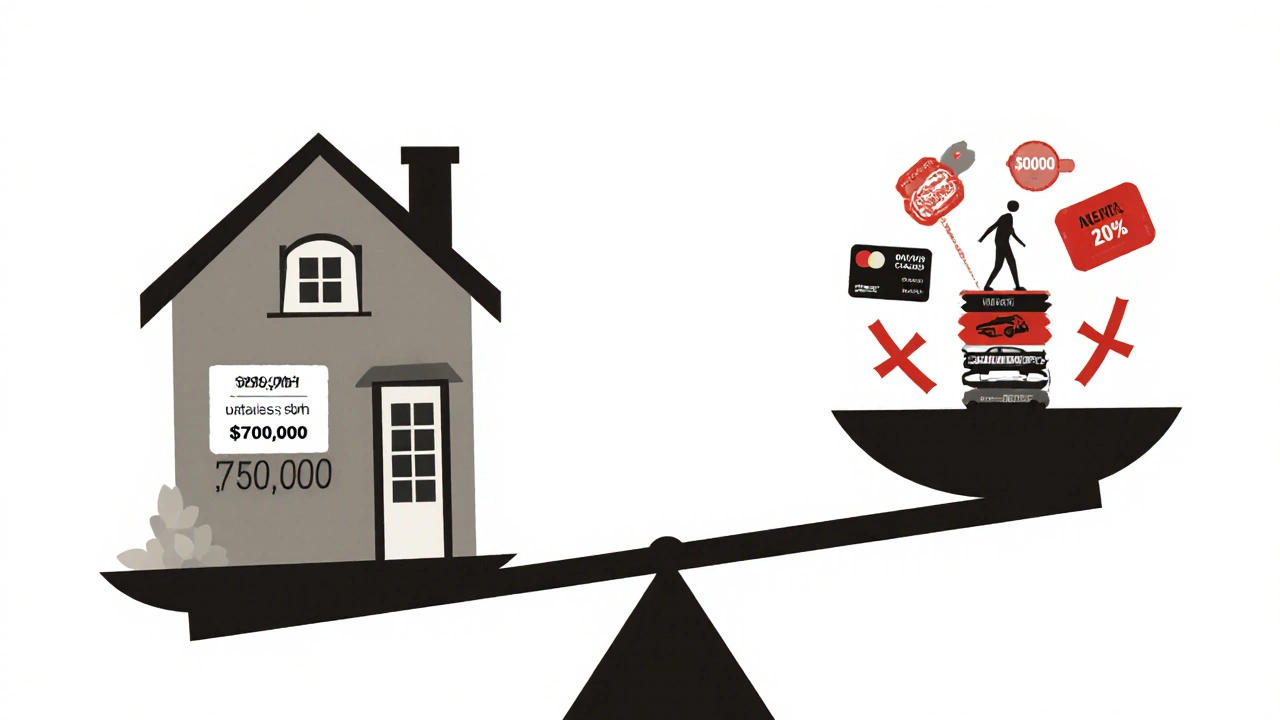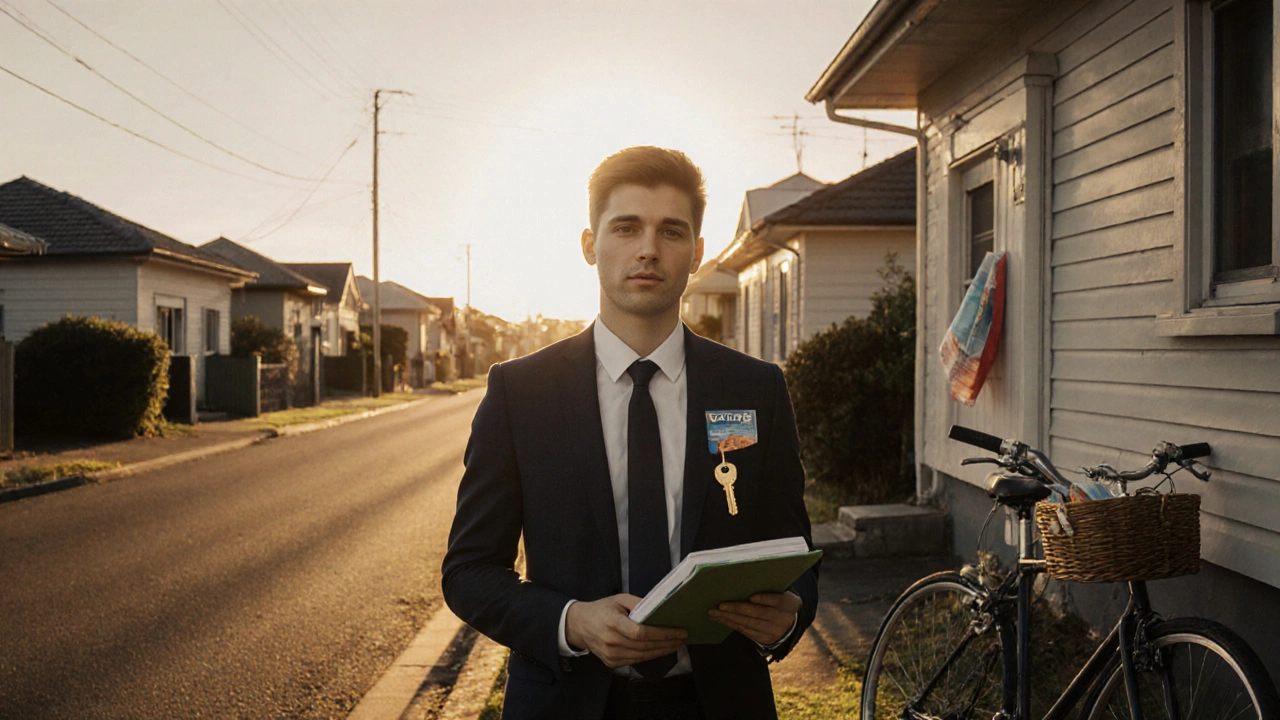Auckland Home Affordability Calculator
Your Financial Information
Your Results
Enter your information to see if you can afford a $700k house in Auckland
Buying a $700,000 house on a $100,000 salary isn’t impossible in Auckland-but it’s not easy either. If you’re a first-time buyer, you’re probably wondering if this dream is just a fantasy or something you can actually make happen. The answer isn’t yes or no. It’s maybe, and it depends on a lot more than just your salary.
What lenders actually look at
Banks in New Zealand don’t just check your income. They look at your entire financial picture. Your $100,000 salary might seem high, but lenders use a debt-to-income ratio to decide how much you can borrow. Most limit your total monthly debt payments-including your mortgage, car loans, credit cards, and student loans-to no more than 40% of your gross monthly income.That means with a $100,000 salary, your max monthly debt payments can’t exceed $3,333. A $700,000 mortgage at a 7.5% interest rate over 30 years would cost you about $4,900 per month in principal and interest alone. That’s already over your limit. Even if you put 20% down ($140,000), your loan would still be $560,000, and your payment would be around $3,920. Still too high.
So what’s the fix? You need to either lower your price, increase your deposit, or reduce other debts. Most lenders won’t even consider you if you’re carrying more than $500 in monthly credit card or personal loan payments. Cut those out first.
Deposit requirements are the real barrier
In Auckland, most lenders require at least a 20% deposit for a first-time buyer to avoid Lenders’ Mortgage Insurance (LMI). That’s $140,000 for a $700,000 house. Saving that much on a $100,000 salary takes time-even if you live frugally.Let’s say you save 30% of your after-tax income. After tax and KiwiSaver contributions, you’re taking home about $6,800 a month. Saving $2,000 a month means it’ll take you 70 months-almost six years-to save $140,000. That’s if you don’t spend a cent on travel, dining, holidays, or car repairs. Most people can’t do that.
Some first-time buyers use the First Home Loan scheme, which allows deposits as low as 10% if you meet income caps. But for a $700,000 house, you’d still need $70,000 down-and your household income can’t exceed $120,000 for singles or $180,000 for couples. You’re on the edge of eligibility. Even then, lenders still require strong credit and low existing debt.
Living costs in Auckland eat into your budget
A $100,000 salary sounds good until you see what it buys you in Auckland. Rent for a one-bedroom apartment in the suburbs averages $550 a week. That’s $2,380 a month. Add utilities, groceries, transport, phone, and insurance, and you’re spending $3,500-$4,000 just to live.That leaves you $2,800-$3,300 for savings, debt, and emergencies. If you’re trying to save $2,000 a month for a house deposit, you’ve got just $800-$1,300 left for everything else. No vacations. No new phone. No unexpected car repairs. No dining out. That’s not a lifestyle-it’s a sacrifice.
And if you have student loans? New Zealand student debt accrues interest at 3.1% annually and is repaid at 12% of income over $22,100. On a $100,000 salary, you’ll pay about $9,300 a year-$775 a month-toward that debt. That’s another $775 gone from your savings pot.

What if you stretch the loan term?
Some lenders will let you stretch your mortgage to 35 or even 40 years to lower monthly payments. A $560,000 loan over 40 years at 7.5% drops your payment to $3,570. Still over the 40% debt-to-income limit. And you’ll pay over $900,000 in interest alone-more than the original loan.That’s not affordability. That’s debt slavery. You’ll be paying off your house until you’re 65, even if you buy it at 30. Most financial advisors warn against this. It locks you into a long-term commitment with no room for life changes-like having kids, switching jobs, or dealing with illness.
Alternatives to a $700k house
Instead of chasing a $700,000 house, consider these options:- Buy in a cheaper suburb: Properties in Manurewa, Papakura, or East Auckland can be $500,000-$580,000. That cuts your deposit requirement by $40,000-$60,000.
- Buy a section and build: Land in areas like Wiri or Botany can be $300,000-$400,000. Build a modest home for $300,000-$400,000. Total cost: $600,000-$700,000, but you own the land outright.
- Co-buy with a family member: If your parents can help with a deposit or co-sign, you might qualify for a larger loan. Some lenders allow joint applications where one person’s income isn’t counted for debt purposes.
- Wait and save: If you can save $2,500 a month for four years, you’ll have $120,000. That’s enough for a $600,000 house with 20% down. Use that time to pay off debt and improve your credit score.

Real stories from Auckland buyers
A 29-year-old nurse on a $95,000 salary bought a $520,000 townhouse in Manurewa last year. She saved $110,000 in four years by living with her parents, cooking every meal, and skipping all subscriptions. Her mortgage payment is $2,100 a month. She’s happy. She’s not living in a mansion, but she owns her home.A couple earning $110,000 and $85,000 bought a $650,000 house in Papatoetoe. They used the First Home Grant ($10,000 each) and got help from their parents for the deposit. Their combined income put them over the income cap for the First Home Loan, but the grant made the difference.
Another buyer, a 34-year-old IT worker, tried for a $700,000 house. He had $100,000 saved, but his $800 monthly car loan and $400 credit card debt killed his application. He paid off his debts, waited a year, and bought a $580,000 house. His monthly payment is $2,600. He says, “I didn’t get the house I wanted. I got the house I could afford.”
When you should walk away
If you need to:- Take on more than $500 in monthly debt besides your mortgage
- Use your entire KiwiSaver balance just to get to 10% deposit
- Live on less than $1,500 a month after bills
- Stretch your loan beyond 30 years
…then you’re not ready. It’s not about being disciplined enough. It’s about being realistic. A house shouldn’t cost you your mental health, your relationships, or your future flexibility.
There’s no shame in waiting. The market doesn’t disappear. Houses don’t vanish. You’re not falling behind. You’re protecting yourself.
Next steps if you’re serious
1. Check your credit score. Get a free report from Equifax or Illion. Aim for 700+.Buying your first home isn’t about matching the price tag you see on Instagram. It’s about building a life you can sustain. A $700,000 house on a $100,000 salary is possible-but only if you’re willing to wait, save, and adjust your expectations. The right house isn’t the one with the biggest kitchen. It’s the one you can pay for without losing your sleep.
Can I get a mortgage on a $100k salary for a $700k house in Auckland?
It’s very unlikely without a large deposit and no other debt. Most lenders cap your total monthly debt at 40% of your income. A $700,000 mortgage at 7.5% interest costs about $4,900/month-even with 20% down. That’s over your limit. You’d need at least $140,000 saved and zero other debts to even be considered.
How much deposit do I need for a $700k house?
For a first-time buyer, most lenders require at least 20%-$140,000. Some allow 10% ($70,000) through the First Home Loan scheme, but your income must be under $120,000 as a single person. Even then, you need a strong credit score and no other debts.
What if I have student loan debt?
Student loans in New Zealand are repaid at 12% of your income over $22,100. On a $100,000 salary, that’s about $775/month. That debt counts toward your total debt-to-income ratio. If you have other debts, you may not qualify for a mortgage at all. Paying off your student loan first gives you the best shot.
Can I use my KiwiSaver for a $700k house?
Yes-if you’ve been contributing for at least three years, you can withdraw your contributions and employer contributions for your first home. You might get $30,000-$60,000 depending on how long you’ve saved. But you can’t use it to cover the full deposit on a $700k house. It helps, but it’s not enough on its own.
Is it better to wait and save or buy now?
If you can’t afford the house without stretching your budget, waiting is smarter. Auckland house prices don’t drop suddenly. But your financial health can improve. Pay off debt, increase your income, save more. A $600,000 house you can comfortably afford is better than a $700,000 house that leaves you stressed and broke.
